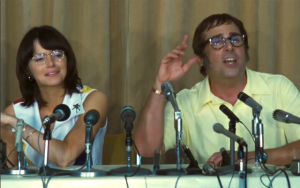Metro Canada: Serving up Billie Jean King’s rise to stardom to a new generation
 By Richard Crouse – Metro Canada
By Richard Crouse – Metro Canada
“Tennis players are like warriors who singlehandedly take on each other,” says director Jonathan Dayton.
One such warrior is Billie Jean King. As a twenty-nine-year old she was vaulted into superstardom in 1973 when she trounced ex tennis champ and self proclaimed Male Chauvinist Pig Bobby Riggs in a match billed as the Battle of the Sexes. It remains television’s most watched tennis match but more than a ratings bonanza for the network it placed King at the forefront of feminism and gender politics in the 1970s. A new film, Battle of the Sexes starring Emma Stone and Steve Carrell, aims to remind audiences of the tennis champ’s importance.
“I hope this is part of a realignment,” says co-director Dayton. “She is very celebrated but since we started showing the movie I think it has been very satisfying for her to get this new level of acknowledgement. I think she felt like she had been celebrated and that was over and now other people are getting attention.”
“She is still so active in all of it,” adds co-director Valerie Faris. “She’s still working. She’s not just out to further her legacy, she’s actually just still working on these same issues. She’s all about fairness and inclusivity. She was the one who said, ‘I want to take it away from being a country club sport and make it for everybody.’”
Battle of the Sexes is undoubtedly a sports movie. The climatic 1973 match takes up much of the last half hour of the film, but it isn’t strictly a tennis drama. Like all good sports films it’s not really about the game, it’s about the human spirit that made King a hero. It also shines a light on her personal life.
Stone plays King as warm but spunky—like Mary Tyler Moore spunky—when we first meet her. The character deepens, however, when Marilyn Barnett, played by Andrea Riseborough, enters the picture. As the married and deeply in the closet King Stone blossoms as the romance with Marilyn blooms.
“It was not a happy time for her,” says Faris. “She says she hasn’t watched the match in twenty-five years. It was hard during the process because we were nervous. We wanted to make her proud and validate who she is.”
“It was very hard for her initially to even enter this process,” says Dayton, “particularly because what was important to us was to tell the story of her first relationship with a woman but, as painful as that was, she was fine with it. She knew that was the most important aspect of it.
“We wanted to show the complexity. She saw this as an affair where she was cheating on her husband. Not only was it a huge move to act on her true sexuality but she loved Larry and didn’t want us to make that relationship seem less than it was.”
As a portrait of women’s rights and the sexual revolution of the 1970s Battle of the Sexes covers a lot of ground.
“What we didn’t want is something that is so polarizing that it would divide the world into two camps,” says Dayton. “Hopefully there are entry points for everybody. Frankly, we wanted it to be entertaining, to be a fun ride.”
